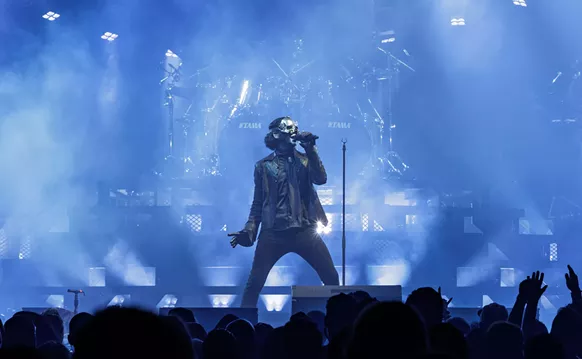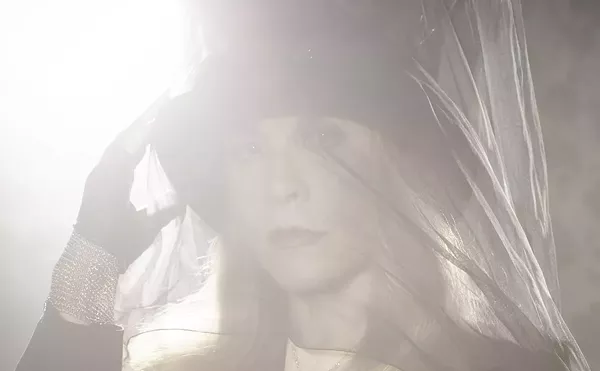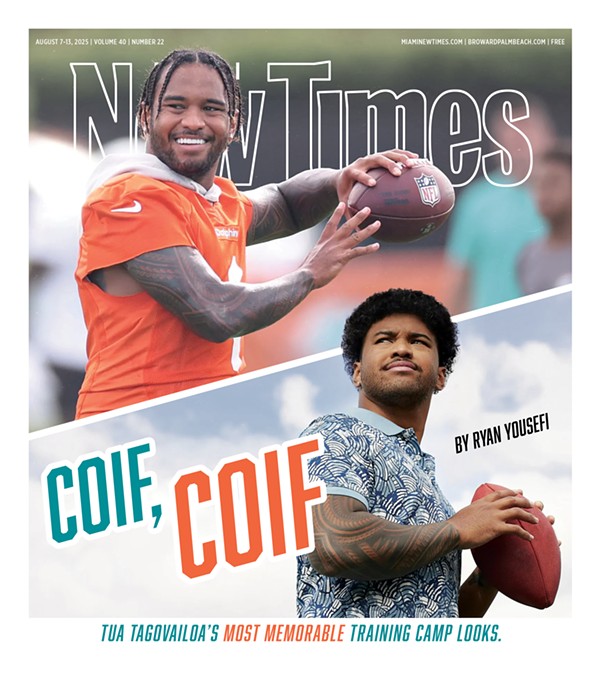Reverend Peyton is the first to admit that the name he gave his outfit -- Reverend Peyton's Big Damn Band -- is somewhat misleading. "We've had so many soundboard people ask us over the years, 'How many channels do you need? I don't know if our board is big enough!' And I tell them, [laughing] 'Your board is probably big enough.'"
The confusion is only natural. For one thing, his so-called Big Damn Band is really just a trio. For another, he's no reverend, at least not in the strictest sense. "People have always called me Rev," Peyton explains. "And when we were naming the band, I had this tendency to identify things as a 'big damn' this or that. Like, 'That's a big damn truck' or 'That's a big damn whatever,' and it became almost like an inside joke. So I came up with the name 'Reverend Peyton and His Big Damn Band.' We had no idea anyone was ever going to care. I researched the name, and I just couldn't believe that no band had ever been called the Big Damn Band before. I thought it was just too good."
It wasn't only the irony of the name that potential fans found confusing; it was their entire MO. On first hearing, it's unclear whether it's a blues band, a jam band, a rock 'n' roll band, a funk band, or an archival Americana act. Not that it matters, because in truth, the band offers some of each.
What's more, if the title of the group's new album, So Delicious, is any indication, mixing it up is just the way the band likes it. This has opened up a wide array of possibilities, especially when it comes to the variety of venues where the trio is welcome. Consequently, it's found itself fitting in just as easily as guests on the Warped Tour (where it was named "Best Band") as it has while headlining at the Telluride Bluegrass Festival, WOMAD, the Cambridge Folk Festival, Glastonbury, or Bonnaroo.
"It's interesting." Peyton concedes. "It's one of the ways we're able to do so many shows and keep it fresh and exciting... not just for the fans but for ourselves. I remember one time when we played a bikers' rally, and then we played a date on the Warped Tour, and then we played a Canadian folk festival, all in the same week! The only thing we might have had to adjust was the set list, but a lot of times, we didn't adjust anything at all." He says interacting with the crowd is key, making it a "communal experience."
It's that depth and variety that's allowed Peyton and his bandmates -- singer/wife Breezy Peyton on washboard and drummer and backing vocalist Ben Bussell -- not only to multitask in their approach but also to find a fit with different audiences without having to alienate any of them in the process. That's quite an accomplishment considering the fact that the band averages some 250 dates a year.
"Sometimes you don't know what to expect, but that's what's so fun about it," Peyton admits. "You have to be able to read their reactions... I don't know if there's the type of venue in the United States that we haven't done... We've played with Derek Trucks and Susan Tedeschi. We've played with Flogging Molly. We've played with Clutch. We've done shows in tents, and we've done Austin City Limits. I feel really lucky in that way, because that's part of what keeps it exciting for me. If we showed up for every show and we knew it was going to be the same thing, same exact set-up, same exact kind of crowd, then maybe it would be boring and maybe it wouldn't be so easy to keep it so fresh."
That's a trait the three have demonstrated since they started some eight years ago. Yet even after five full-length albums and a handful of EPs, the group has managed to maintain its momentum. Ask Peyton about the source of his musical inspiration and his answer comes easily. It derives from the place he's always called home, Brown County, Indiana.
"It's in the Southern Indiana hills, near the border with Kentucky," Peyton replies. "It's a secluded, rural place that few folks are even aware of, but it's always influenced the content of my songs. I get messages all the time from my friends. 'Man, why don't you come to Austin? It's really happening here.' Or, 'Man, come to Nashville; that's where it's all going on.' But I refuse to leave my home, and I refuse to sing songs that don't reflect this place that I'm from... People that are from here know what life is like in this area. The rural environment that I grew up in covers every aspect of my songs. People are so used to hearing this characterization of what life is like out in the country, so I think when they hear a song describing what life is really like out here, they don't quite understand."
Jokingly, he adds, "My wife says I could work for the local chamber of commerce with all the good things I say about this place!"
Press Peyton further and he'll admit that his infatuation with his early idols has also had a lingering effect on his music. "One thing I love about my heroes -- Charlie Patton, Furry Lewis, Mississippi John Hurt -- is that they didn't live by any set rules for what their music was," he explains. "They only put out stuff they thought was really great. In blues music -- and in the modern world -- that's something we seem to be lacking. Everybody's got a formula, 12 bars, and turn around, and shuffle. And that's it. But there's so much more to it."
He says that on the band's latest release, he pushed himself, asking, "What can I do with finger-style country blues guitar that's never been before?" And so he experimented with the sound.
And when it comes to the blues, Peyton has even more clarifying to do. "Blues is the oldest genre of uniquely American music, and there's a lot more to make, but only if we keep pushing it and trying to make it sound fresh. We have to understand where it comes from but also ensure that it remains in the here and now as well." And the best way to do this? "If you're going to play the blues, then you have to write about stuff you're living. Blues is different in terms of its subjects. In certain genres of music, you can make up stories and write songs that are fiction and it can work. But not in blues. Blues music forces you to open yourself up. And that can be a scary thing; when you take a song that's 100 percent autobiographical and it's so incredibly personal, you run the risk of them not liking you."
Reverend Peyton's Big Damn Band, 9:30 p.m., Friday, March 13, at Vintage Tap, 524 W. Atlantic Ave., Delray Beach. Tickets cost $10 and $15. Call 561-808-7702, or visit facebook.com/vintagetap.
New Party Rules for Millennials
Top 20 Sexiest R&B Songs from the '90s to Today
Ten Best Florida Metal Bands of All Time
Ten Most Annoying Drunk Dudes You Meet at a Bar
Follow @CountyGrind











